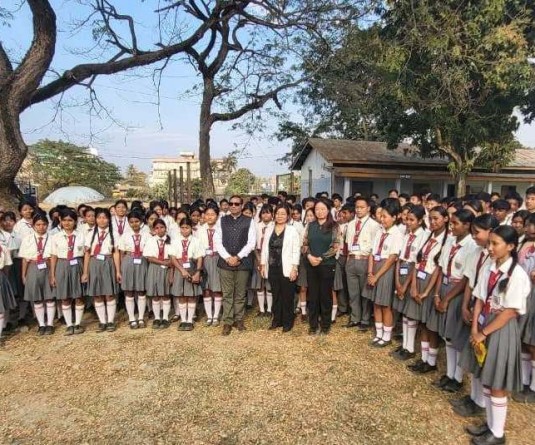
KOHIMA, DECEMBER 10 (MExN): The 10th day of the 25th Edition of the Hornbill Festival brought together the vibrant cultures of Nagaland as various Naga tribes presented their unique traditions and performances at the Naga Heritage Village in Kisama, Kohima, on December 10. The event was held under the theme “Cultural Connect” and was presented by the Department of Art & Culture.
The morning session was graced by Advisor of Geology & Mining, DUDA, W. Chingang Konyak, who joined as the co-host. Highlights of the morning performances included Thele Lu (folk song) by the Chakhesang Cultural Troupe, traditionally performed by men during village movements; Titse Nyeh Khidong, a millet harvesting song by the Sangtam Cultural Troupe known for its melodious tune; and Zakhama Kehou, a folk song presented by the Angami Cultural Troupe.
The Ao Cultural Troupe impressed with Watemdong, a distinctive dance combining body movements, drum beats, and rhythmic hopping. Meanwhile, the Khiamniungan Cultural Troupe performed Jamhang, a folk dance traditionally enacted during feasts to share blessings. Shietu Khin, a men’s action song by the Tikhir Cultural Troupe, depicted the hardworking spirit of men tilling fields through song and coordinated effort.
One of the key performances was Aphilo Kuwo, a warrior dance by the Sumi Cultural Troupe symbolizing victory, gratitude, and strength. The Phom Cultural Troupe presented Pangital, a powerful commemorative story of a courageous woman defending her village, while the Garo Cultural Troupe performed Dim Dim Chong, a folk song celebrating the Wangala Festival.
The afternoon session witnessed performances attended by distinguished guests, including Baushuan Ger, Ambassador of the Taipei Economic and Cultural Center in India; actor and film producer Zayed Sanjay Khan; and Rohit Gopakumar, Group CEO of Times Group. Hosted by Temjenmenba, Minister of Rural Development and SIRD, this session brought further vibrancy with the Lotha Cultural Troupe performing Tokhu Sharü—a dance marking the end of agricultural activities and the onset of festive celebrations.
The Zeliang Cultural Troupe displayed Tatin Tinbo, a demonstration of traditional sowing with bamboo baskets, symbolizing teamwork and tradition. The Chang Cultural Troupe performed Shangpele, a symbolic festival dance linked to marriage and clan relationships. Meanwhile, the Rengma Cultural Troupe offered a live demonstration of cotton spinning, reflecting the traditional roles of women in creating shawls and woven goods.
The Kuki Cultural Troupe shared Suhta Lam Dance, also known as the Pestle Dance, and the Konyak Cultural Troupe performed Shamshu Lok/Oung Kham, a traditional log drum performance conveying messages during times of festivity, mourning, or war.
Awards were distributed at the conclusion of the performances. The Ao Cultural Troupe won the award for the Best Commemorative Performance with a certificate and `20,000 in prize money. The Konyak Cultural Troupe was named the Best Performing Cultural Troupe, receiving `15,000, while the Rengma Cultural Troupe came second with `10,000. Additionally, Ao Morung, Chang Morung, and Konyak Morung were recognized as the best morungs, and the best stalls were awarded to Tepok Oshidak, Nouva, and Ao Fusion.






